
 Flash News
Flash News
EU Integrity for Sale: Tirana Edition
Two people are arrested in Vlora, they are caught with narcotics divided into doses ready for sale
Martin's murder trial, Luis Meçe's father clashes with the prosecutor: You are sleeping with the file
Accident in Astir/ Car drags a person across the white lines
Celibashi: The CEC platform fell victim to several cyberattacks during the elections
Citizens pay out of pocket for health funds at the lowest level since 2017

Public spending on health in Albania fell to its lowest level since 2017, accounting for only 9.6% of total public spending in 2024, according to a report by the organization "Together for Life".
According to the analysis, although the budget of the Ministry of Health and Social Protection has increased significantly during the pandemic years (2017–2021), the years 2022 and 2023 have marked a progressive contraction of funding.
"In 2024, despite the increase in nominal value, the total expenditures of the Ministry of Health and Social Protection continue to be decreasing, resulting in 3.2% of GDP and 10.8% of total public expenditures. Public spending on health and social protection in 2024 marks the lowest level measured over the last 7 years," the report states.
The report highlights that in recent years the health sector in Albania has been underfunded, especially in terms of health care services.
"This is further reinforced by the high level of out-of-pocket payments with over 50% of the total expenditures incurred for healthcare, which are borne by the citizens themselves," the report states.
At the regional level, our country ranks last in terms of expenditures in the health sector.
"In addition to the fact that these expenses are the lowest, the analysis also shows a discrepancy between the figures reported by the Albanian government in its official documents and those published by international institutions."
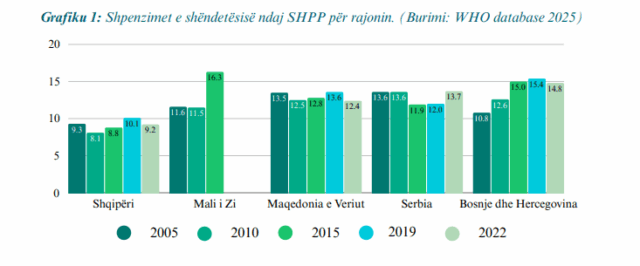
Albanian citizens continue to pay out of pocket for health services, more than other countries in the region, with a level of 51.3% in 2022.
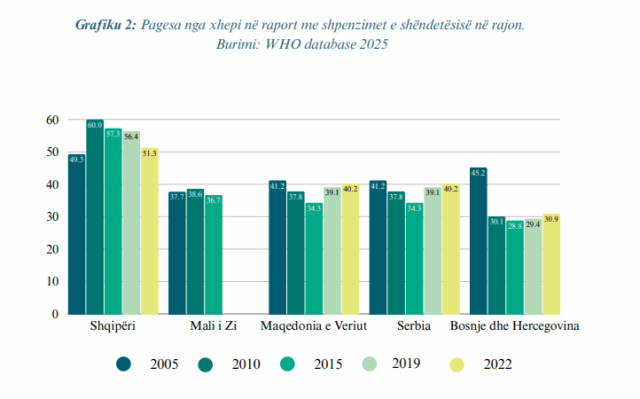
As for the procedures followed for public tenders in healthcare, according to the report, the contracts are concentrated in a few operators.
"A small number of companies win most tenders in the pharmaceutical and medical device sector, limiting competition and excluding new or small operators," the report states.
At the top of the list of operators that have benefited the most contracts over the last few years are:
While in 80% of the canceled procedures occurred due to errors by the responsible staff.
"Out of 122 cancelled procedures, 98 were cancelled due to errors in the tender documentation, reflecting serious shortcomings in their preparation and management."
Also, a low level of competition is observed in the tendering processes, with an average of 1.37 economic operators per procedure.
The differences between the limit fund and the winning bids for each lot are minimal according to the report, raising concerns about the lack of effective competition and the criteria that have influenced this outcome.
In conclusion, the report suggests some recommendations that focus on increasing public spending on health, improving transparency and data publication, increasing competition in tenders, strengthening monitoring and audit mechanisms, and reviewing the legal framework./Citizens.al
Latest news


Diaspora vote, Berisha: The envelopes were filled in Albania
2025-05-22 22:45:58
"Notify the DEA", Abilekaj: Internationals do not trust our institutions
2025-05-22 22:30:07
Operation "Bridge", journalist: SPAK was used as an election certifier
2025-05-22 22:07:35
Berisha: Rama won 28 mandates with criminal gangs
2025-05-22 21:58:18

Fevziu clarification for Artan Lamen: He is still alive, but in a coma
2025-05-22 21:44:33


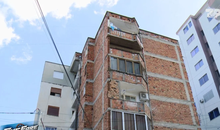

Which of the punitive measures has the EU started to remove from Kosovo?
2025-05-22 20:49:38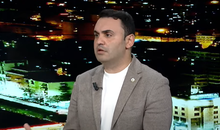
Këlliçi: SPAK acted after the elections, directed by Rama
2025-05-22 20:42:10



EU Integrity for Sale: Tirana Edition
2025-05-22 19:51:52
Plane crashes into homes in San Diego, California, several casualties reported
2025-05-22 19:49:43
May 11th Elections, Source: With the Bulgarian Train, he wins 300 thousand votes
2025-05-22 19:34:16
Citizens pay out of pocket for health funds at the lowest level since 2017
2025-05-22 19:21:43
After three terms/ Erdogan: He will not run for president again
2025-05-22 19:08:35

SPAK seized two properties in 'Kodra e Diellit', Veliaj and Xoxa's lawyers react
2025-05-22 18:42:25

Symbolic or essential? The risk of women's representation in the new Parliament
2025-05-22 18:14:54


Kaja Kallas: We have started to lift the measures against Kosovo
2025-05-22 17:20:29


How to store aromatic herbs so they stay fresh for weeks
2025-05-22 16:50:07

Operation URA, a bridge that connected crime, power and the silence of SPAK!
2025-05-22 16:30:21
CIA Alert/ Shooting outside Langley headquarters, one injured
2025-05-22 16:20:53






"Anti-drugs also hit the police", the US trusts citizens more than institutions
2025-05-22 15:24:51
Israel releases photos and identities of two embassy employees killed in US
2025-05-22 15:18:02

Kallas in Belgrade: Serbia must prove that it truly aims for EU membership
2025-05-22 14:56:45

Parliament returns, MPs to hold plenary session on Thursday
2025-05-22 14:34:25


Accident in Astir/ Car drags a person across the white lines
2025-05-22 14:00:14
Wave of dismissals in Tirana Municipality, Ristani dismisses Veliaj's associates
2025-05-22 13:53:26
A month after Kashmir attacks, Indian PM rules out talks with Pakistan
2025-05-22 13:40:41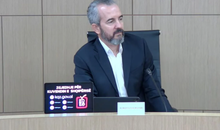

WHO report: Population is aging, social policies are needed
2025-05-22 13:23:12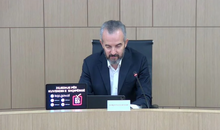


Patient dies during surgery, doctor prosecuted in Durrës
2025-05-22 12:54:55

The “Black Eagle” dossier in Brussels exposes money laundering in Albania
2025-05-22 12:39:16
Berisha publishes video: Voter lists and ballots were found in the village bar
2025-05-22 12:30:29




"5D" file, debate between the defendants' lawyers
2025-05-22 11:37:05

Hoxha: The Troplini received projects from the Prime Minister, appointed leaders
2025-05-22 11:16:59
Këlliçi: The elections, a farce organized by the state and organized crime
2025-05-22 11:07:19
"Toyota Yaris", GJKKO sentences lawyer Radovan Çela to 4 years in prison
2025-05-22 10:56:47


Anti-drug mega-operation, checks at the Port of Vlora
2025-05-22 10:13:54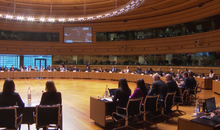



European Union's top diplomat Kallas visits Serbia and Kosovo
2025-05-22 09:36:58
Capital investments at lowest level since 2010
2025-05-22 09:27:12
Two Israeli Embassy staff members killed in Washington
2025-05-22 09:12:46
Pyjet tropikale pësuan shkatërrim rekord në vitin 2024
2025-05-22 09:04:20
Foreign exchange, May 22, 2025
2025-05-22 09:00:12

Accident on the Durrës-Tirana highway, vehicle overturns on the road
2025-05-22 08:31:24

Horoscope, what do the stars have in store for you today?
2025-05-22 08:08:02
Showers, what are the temperatures expected to be like during the day?
2025-05-22 07:54:04
Morning Post/ In 2 lines: What mattered yesterday in Albania
2025-05-22 07:41:33


Germany extends the stay of its troops in Kosovo
2025-05-21 22:19:22
Journalist: Xhevdet Troplini alongside a politician
2025-05-21 22:00:07
Amnesty International: Camps in Albania, a reflection of an inhumane system
2025-05-21 21:49:09
This is the first Albanian justice collaborator
2025-05-21 21:39:45
Bitcoin breaks historical record: Reaches $109,302
2025-05-21 21:36:06
Raped by colleague at the civil registry office, victim fired from job
2025-05-21 21:08:47
Hyn në fuqi vendimi i BSH/ Kredia për blerje banese kufizohet nga 1 korriku
2025-05-21 21:04:37
“Nga dhuna e burrit humba fëmijën”, nëna e dy të miturve kërkon drejtësi
2025-05-21 20:50:23
The government extends the stay of Ukrainians in Albania
2025-05-21 20:45:04
Social networks: Friend or foe of our personal relationships?
2025-05-21 20:22:33


